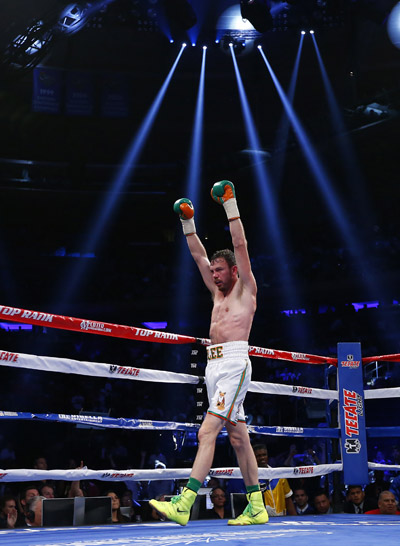Andy Lee’s quiet road to world champion
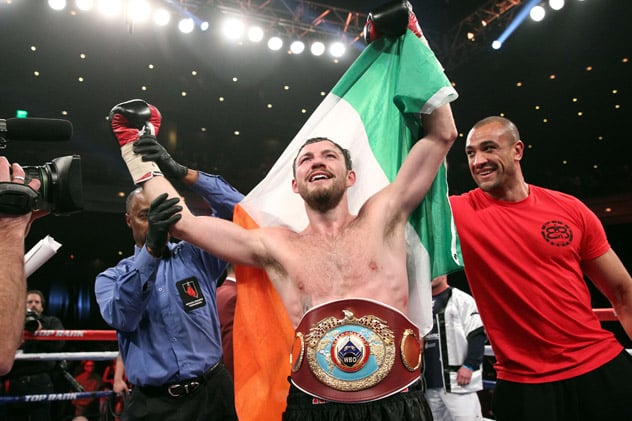
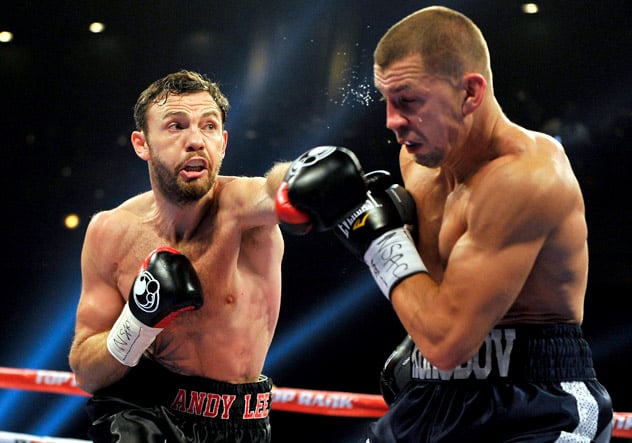
Irish middleweight Andy Lee (L) fighting Matt Korobov for the vacant WBO title on Dec. 13, 2014. Photo by David Becker/Getty Images.
Contrary to the inseparable image they now project, when it came to Irishman Andy Lee, the headhunted coach took some persuading at first. Adam Booth, though flattered by the approach and the interest, was utterly indecisive and for weeks scratched his head, considered his options and sought opinions. It was September 2012 and he had other projects on the go. Both David Haye and George Groves were under his wing. The inn was full.
Asked to replace the irreplaceable Emanuel Steward, with whom Lee had previously worked and lived for seven years, Booth’s concerns were twofold. He was worried about his own ability to train a world-class southpaw, having never done so before, and he was worried about Lee’s athleticism, or lack thereof, and his apparent inability to fight on the inside. You see, while Booth was accustomed to working with long-range punchers like Haye and Groves, those men happened to be natural athletes with a fair degree of explosiveness. Languid Lee, by contrast, was more of a slow-burner, less showy, less obvious, a session musician rather than frontman.
As such, Booth stressed it would only be a trial period and that it was unlikely to go any further. But then he started to let his heart rule his head. “Andy’s such a nice fella,” he told me that summer. “He’s the sort of fella you’d want to work with just because he’s so genuine.”
Months later, with the trial period well underway, Lee confided in me and revealed that Booth wasn’t the only one of the two analyzing character traits. “I went and watched (the film) ‘The Master’ the other day with Maud (his wife) and I said to her, ‘This guy reminds me of Adam.'”
The guy in question was Lancaster Dodd, cult leader of a religious movement known as The Cause, who seemed loosely based on Scientology founder L. Ron Hubbard and was played with gusto by Philip Seymour Hoffman. Dodd, unlike Booth, was blonde and fat. He was also, however, charismatic, enigmatic, persuasive and powerful, attributes Lee had come to associate with his new mentor.
For The Cause, see the gym. First they trained together in Vauxhall, London and then later in Coulsdon, Surrey, nearer Booth’s home. Lee, under a spell, was happy to uproot and go along for the ride.
“When I look back at it,” he said, “it seems really harsh and tough. But, when you’re in the midst of it, it seems like nothing. You don’t even think about it. It’s the situation you find yourself in and you get on with it. I knew that was the best place for me to be because I could learn from Adam.
“In hindsight, though, it was an arduous process. I was staying wherever I could and training with other trainers, assistant coaches, and going through trials in the hope I’d impress enough to then train with Adam.”
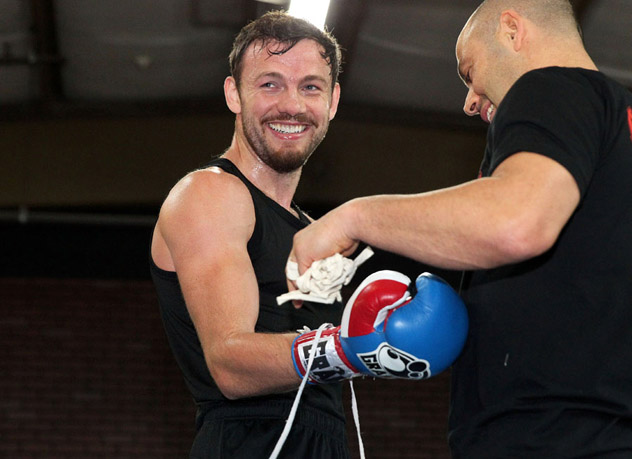
photo by Chris Farina
No stranger to life on the road, Lee, eager to spend quality time with a coach he’d sourced, moved into rented accommodation in Purley, Surrey, a two-minute drive from Booth’s home, and shared the place with a number of housemates. At first, he knew nobody in the area and knew nobody in the house. His personal space was a box-room consisting of a single bed and a small table. On the table were two tablet devices, a Mac computer, a pair of white headphones and a Kindle in a black wallet. There was a television at the end of his bed and, between training sessions, he’d hook up a tablet to the television and watch an American crime series. There was also a half-eaten packet of rich tea biscuits, his favorites, on a shelf.
“There are two people in this place I still haven’t even seen yet,” he said. “We all come and go at different times and nobody likes to spend time together in the kitchen. Everyone keeps themselves to themselves and each room is like its own little house. When you’ve got televisions, computers, phones and music, you kind of create your own little world.
“Weirdly, there were no checks done on me when I showed an interest in taking a room here. I could have been a serial killer for all they knew.”
Lee wasn’t a serial killer, but he was certainly a quiet man. He kept himself to himself, just like the others, and shimmied on through to the kitchen only when certain the coast was clear. Then he started to prepare a meal – pasta, tuna, olives and garlic in tomato source – and, while cooking, heard a noise coming from the shower down the hallway. “Ask him his name, will you?” he said to me. “He told me once but I forgot it.”
A housemate soon entered the kitchen, put his tagliatelle in the microwave and introduced himself as Mark. “Bet you can’t remember my name, can you?” he said to Lee. “I remember yours. I knew we’d quickly forget names around here. We need name-tags.”
The strangers discussed recent rugby matches as Lee looked for a sieve and found one in Mark’s drawer. “Help yourself,” said Mark. In return, Lee pointed to his own drawer and said Mark was welcome to gorge on whatever food he found inside.
“There’s almost a silent agreement in place where we use the kitchen at different times and make sure we don’t overlap. Then we go to our rooms, sleep and go to work the next day.”
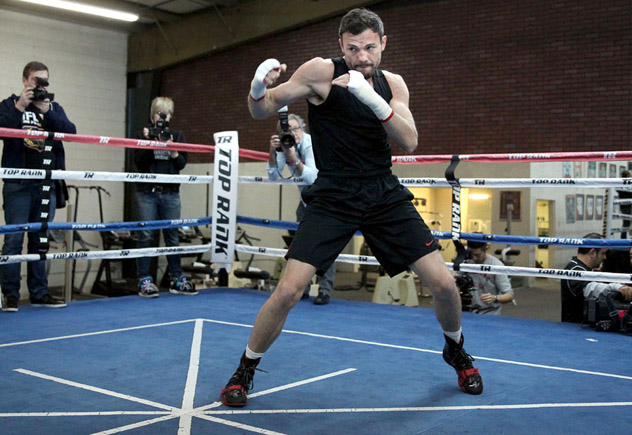
photo by Chris Farina
Work meant a different thing for both men. For Mark, it meant working in Braintree, Essex, as an electrical engineer. For Lee, however, it meant finishing his meal, resting for a couple of hours and then traveling the five minutes it took to get to the boxing gym.
If you’d told Mark or, indeed, any of Lee’s mystery lodgers that year that the quiet Irishman in the room at the end of the corridor would one day become WBO world middleweight champion, they’d have simply continued walking past him en route to the communal kitchen or shower. But it happened in Las Vegas last December when Lee knocked out Russian Matt Korobov in round six. “I didn’t win that title because of the camp I’d had,” he said. “I won that title because of every camp and everything I’ve been through in the last two years.
“All in all, I think it was a very good performance. And, even though I knew I was losing the fight, narrowly, I didn’t think it could have gone any better. At the time I felt great about the way it was going.
“I think the judges and commentators scored the fight the way they expected it to go. If a round is close, they’ll score for the guy they expect to win the round – the favorite. They had a predetermined view of the way the fight was meant to go and Korobov, in their mind, was supposed to be winning rounds.”
Behind on the cards going into the sixth, Lee would become world middleweight champion thanks to his trusty right hook, swung hard and fast as the pair traded at center ring. The shot cracked Korobov’s chin, robbed him of his equilibrium and triggered a multi-punch finishing salvo. Never had Lee looked more assured in closing the show.
photo by Rich Schultz/Getty
[After a fight] you suffer an adrenaline dump and realize no amount of partying is going to beat the buzz you got from what happened in the ring.
“I’m a lot more experienced and mature than I was two years ago,” said the 30-year-old. “Technically, I’m a lot better, too. I’m more athletic and comfortable on the inside. I have a lot more tools now and more ways to fight. I used to only have one way to fight. I’d keep it long with straight punches and then show aggression whenever I could.
“But now I can fight off the back foot, fight going forward, fight in close and fight on the outside. That’s all down to Adam. We’ve been constantly working on being comfortable in close and not panicking. I’ve learnt to be a lot more relaxed in the shoulders and to reduce the element of panic, which only burns up energy, when a fight is fought at close quarters.”
After the fight, Lee retired to his trainer’s room and ordered everything on the room service menu. He was then in bed by half past twelve, unusually early given the magnitude of what he had just accomplished. “I never like to party or stay up too late after a fight because it’s always a bit of an anti-climax,” he said. “You suffer an adrenaline dump and realize no amount of partying is going to beat the buzz you got from what happened in the ring. So I just stayed awake in bed thinking about what had happened and only got three or four hours sleep.”
As Lee and his team jumped for joy and reacted with justifiable surprise to the dramatic manner of victory, Marie Steward, widower of Emanuel, stood off from them and smiled knowingly. She’d made the trip from Detroit to Vegas for the sole purpose of watching Lee, something of an adopted son in the Steward household, fulfill his and Emanuel’s longtime dream.
“It meant so much to me to see Marie there,” said Lee. “We used to go to church together on a Sunday and we’d also go to the movies together, especially in the early years. She helped me settle when I first got to Detroit.
“She was probably the coolest person in the changing room. You could tell she’d been through this so many times with so many fighters over the years. It was great to have her there, though. As soon as I heard she was coming, I knew I couldn’t lose.”

photo by David Becker/Getty
Still, he admits he shed a tear in the aftermath. “Just one,” he said. “That was all I was letting out.” A breakthrough of sorts, for Lee is about as stoic and cool as any fighter in the sport, that solitary tear symbolized just how momentous a moment it was for the new champion.
It didn’t end there, either. Days later he flew to Limerick, Ireland, and was welcomed by thousands of locals who braved a downpour to welcome home their hero. “It was a strange period,” he said. “When I came home to Limerick, I was in the newspapers every day, front and back pages. There was huge coverage after the fight.
“I got back to Dublin and it was kind of weird. I didn’t want to go out on my own. I remember being a bit wary the first time I had to go out on my own. Everybody was really good about it, though. I had no negative comments. They all just wanted to congratulate me.
“Then, after Christmas, I did the ‘The Late Late Show’ — which is the biggest show in Ireland, and that was something else altogether. It wasn’t just boxing fans or sports fans watching. The whole country watched.”
Limerick and limelight now over, Lee is thankful for the hush. It allows him to get back to work. “I have to admit that you do like it when people come up to you and recognize you,” he said. “It’s even nicer when they say good things about you. I can’t complain about it too much because it’s no real stress on me. It’s a by-product of success and I want to be successful.
“It can be hard sometimes, though. You want to get on with your life again. Keep yourself to yourself, do what you have to do. That’s what I’m used to.”
He paused for thought and smiled. “It could have been a lot worse. I could have lost the fight and been left alone all Christmas. Nobody would have wanted to speak to me. There’d be no appearances, no interest, no belt.”
For now, he lives in Monte Carlo with his trainer and a couple of other boxers. It’s quiet, it’s hot, it works as yet another temporary home.
“Adam always said I could stay with him but I was hesitant because I didn’t want to impose,” he said. “He’s got a wife and two children living with him and it didn’t seem right. Time went on, though, and we became very close. So, when I did eventually move in with him, it was fine and it felt natural and comfortable.
“Maud and I were looking at houses in Dublin last year and we’ll be buying one very soon. But while I’m fighting I think I’ll always be on the road. It’s all I’ve known. It’s what I like.”



